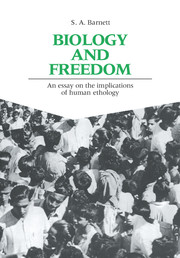Book contents
Part 3 - Homo egoisticus: the selfish species
Published online by Cambridge University Press: 04 August 2010
Summary
Man, in a word, has no nature; what he has … is history.
Ortega y GassetThe image of humanity as intractably selfish includes some features of H. pugnax, but also uses the modern theory of evolution. We are told that even our social lives and attitudes can be fully explained by the action of natural selection on our ancestors. Just what the new Darwinism does and – equally important – does not tell us comes, with some unavoidable technicalities, in the next chapter. Many questions remain; in particular, no theory tells us how the human species acquired its special features. The explanatory value of natural selection has often been overrated, partly because, for some influential writers, it is more than a scientific theory: it has become a substitute for the workings of divine providence.
Evolutionary theory rests on genetics, and so does human biology: it is impossible to make sense of biological accounts of humanity unless one understands the interaction of heredity and environment. This, as we find in Chapter 7, is a continuing source of confusion. It is still usual to describe characteristics as inherited or genetically coded, and to write of genes for traits such as (for example) intelligence or mental deficiency. As a result, our genes come to be thought of as imposing an unchangeable destiny. The error in such expressions arises from disregard of the environment – one, moreover, that in part we create by our own choice.
- Type
- Chapter
- Information
- Biology and FreedomAn Essay on the Implications of Human Ethology, pp. 77 - 79Publisher: Cambridge University PressPrint publication year: 1989



